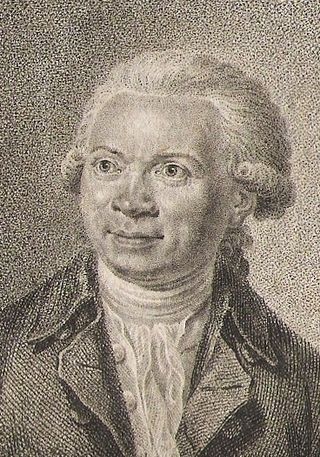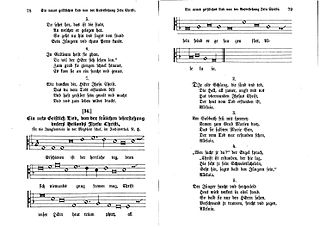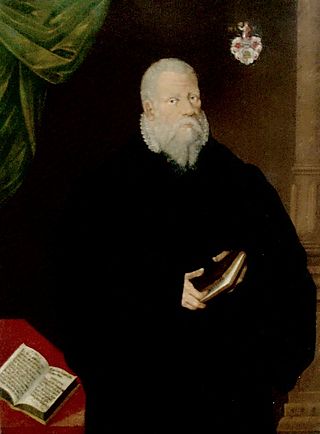
Matthias Claudius was a German poet and journalist, otherwise known by the pen name of “Asmus”.
"Der Doppelgänger" is one of the six songs from Franz Schubert's Schwanengesang that sets words by Heinrich Heine for piano and tenor voice. It was written in 1828, the year of Schubert's death.

Johann Abraham Peter Schulz was a German musician. He is best known as the composer of the melody for Matthias Claudius's poems "Der Mond ist aufgegangen" and "Wir pflügen und wir streuen", and the Christmas carol "Ihr Kinderlein kommet".
Volkslied is a genre of popular songs in German which are traditionally sung. While many of them were first passed orally, several collections were published from the late 18th century. Later, some popular songs were also included in this classification.

Johann Wilhelm Hill was a German pianist and composer.
Hermann Reutter was a German composer and pianist who worked as an academic teacher, university administrator, recitalist, and accompanist. He composed several operas, orchestral works, and chamber music, and especially many lieder, setting poems by authors writing in German, Russian, Spanish, Icelandic, English, and ancient Egyptian and Greek, among others.

"O Welt, sieh hier dein Leben" is a Lutheran Passion hymn in German by Paul Gerhardt. In 16 stanzas of 6 lines, it was first published in 1647 in Johann Crüger's Praxis pietatis melica. The hymn is known as the source for chorales in Bach's Passions. It was translated to English in several versions, for example "O, World! behold upon the tree" by Catherine Winkworth in 1858.

Praxis pietatis melica is a Protestant hymnal first published in the 17th century by Johann Crüger. The hymnal, which appeared under this title from 1647 to 1737 in 45 editions, has been described as "the most successful and widely-known Lutheran hymnal of the 17th century". Crüger composed melodies to texts that were published in the hymnal and are still sung today, including "Jesu, meine Freude", "Herzliebster Jesu", and "Nun danket alle Gott". Between 1647 and 1661, Crüger first printed 90 songs by his friend Paul Gerhardt, including "O Haupt voll Blut und Wunden".

"Vom Himmel hoch, da komm ich her" is a hymn text relating to the Nativity of Jesus, written by Martin Luther in 1534. The hymn is most often sung to the melody, Zahn No. 346, which first appeared in a 1539 songbook and was probably also composed by Luther. This classic Christmas carol remains popular and has inspired many choral and organ works by other composers.
"Herr Jesu Christ, wahr Mensch und Gott" is a Lutheran hymn by Paul Eber. It is a hymn for the dying. One of the hymn's tunes, Zahn No. 423, is also used for "Wir danken dir, Herr Jesu Christ".

"Erschienen ist der herrlich Tag" is a German Easter hymn, with text and tune written by Nikolaus Herman and published in 1561. It has inspired musical settings by composers from the 17th to the 20th century. It appears in several hymnals, including the German Protestant hymnal Evangelisches Gesangbuch. Other hymns, especially Easter hymns, in both German and English, are sung to the same melody.

"Nun lasst uns Gott dem Herren" is a Lutheran hymn of 1575 with words by Ludwig Helmbold. It is a song of thanks, with the incipit: "Nun lasst uns Gott dem Herren Dank sagen und ihn ehren". The melody, Zahn No. 159, was published by Nikolaus Selnecker in 1587. The song appears in modern German hymnals, including in the Protestant Evangelisches Gesangbuch as EG 320.

"Es spricht der Unweisen Mund wohl" is a Lutheran hymn of 1524, with words written by Martin Luther in 1523, paraphrasing Psalm 14. It was published as one of eight songs in 1524 in the first Lutheran hymnal, the Achtliederbuch. It was also published later that year in the Erfurt Enchiridion. It has appeared in many hymnals, both in German and in translation. The text inspired vocal and organ music by composers such as Johann Pachelbel.

St. Michaelis is one of the main churches in Lüneburg, Lower Saxony, Germany. It was first an abbey church of the former monastery of Benedictines, built from 1376 in brick Gothic style. It became Lutheran during the Reformation. Johann Sebastian Bach was for two years a pupil at the school of St. Michaelis.

Johann Balthasar König was a German Baroque composer, especially of hymn melodies, having published a hymnal with 1,913 melodies. He was the church musician at Frankfurt's main Protestant church, the Katharinenkirche, and the town's Kapellmeister. He was also closely associated with Georg Philipp Telemann.

"Macht hoch die Tür" is a German popular Advent hymn, written in Ducal Prussia in the 17th century. The lyrics were written by Georg Weissel in 1623, for the inauguration of the Altroßgärter Kirche in Königsberg. The melody that is now associated with the text appeared first in 1704 in the hymnal by Johann Anastasius Freylinghausen.
Daniel Rumpius was a German Lutheran theologian, minister and hymnwriter.
"Lob Gott getrost mit Singen" is a Lutheran hymn in German, a paraphrase of the Latin Te Deum, by the Bohemian Brethren. The hymn is part of the current Protestant hymnal. The hymn was translated into English as "Praise God, praise God with singing". The hymn tune was used for several hymns in different languages, denominations and centuries.
"Dir, dir, Jehova, will ich singen" is a Lutheran hymn, with 1695 text by Bartholomäus Crasselius. A melody attributed to Johann Sebastian Bach appeared in Schemellis Gesangbuch. It was translated into English by Catherine Winkworth in 1863 as "Jehovah, let me now adore Thee". The song became part of many German hymnals, such as Evangelisches Gesangbuch and Gotteslob. From the 1930s, the hymn has often been rendered as "Dir, dir, o Höchster, will ich singen".












